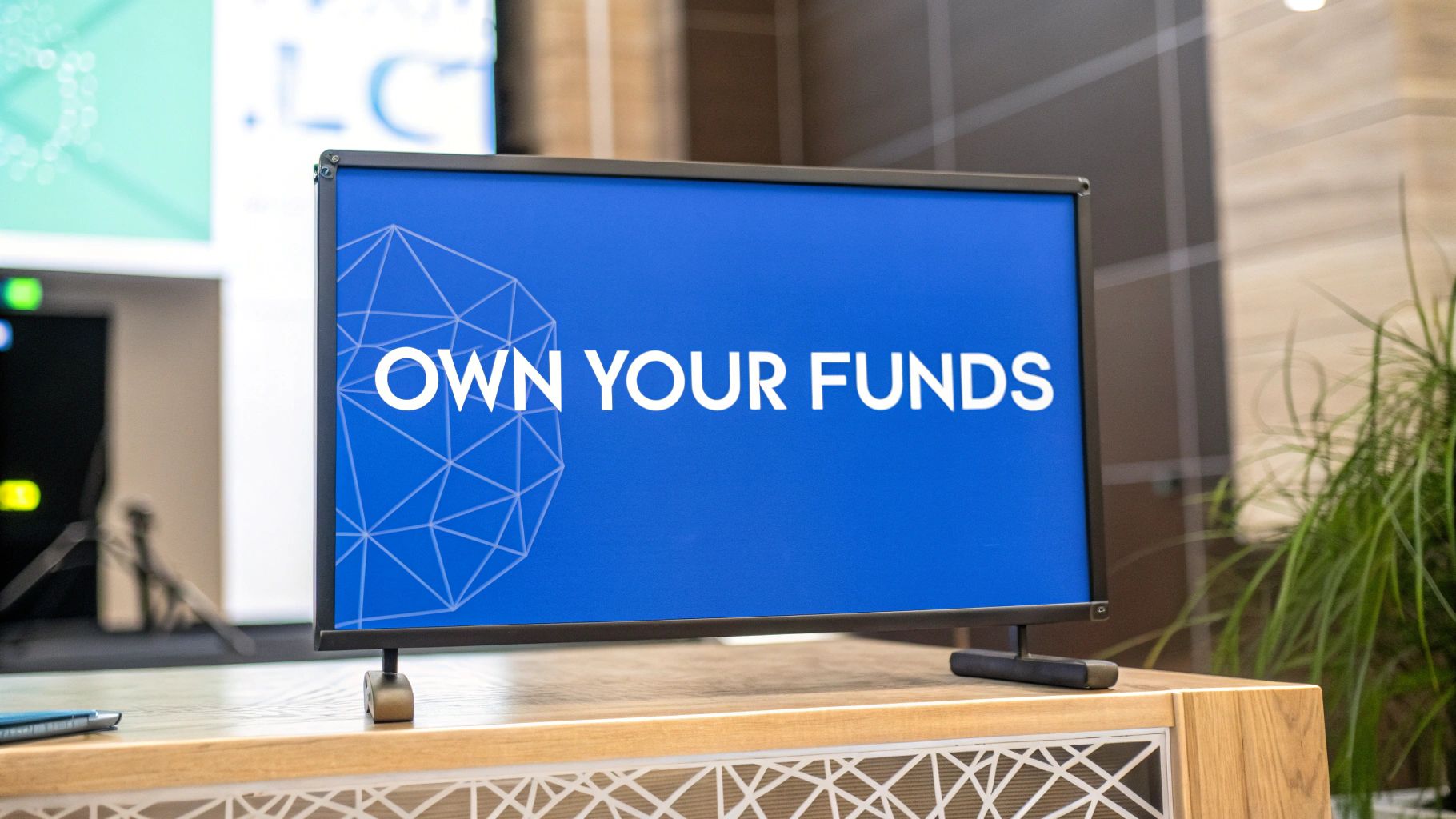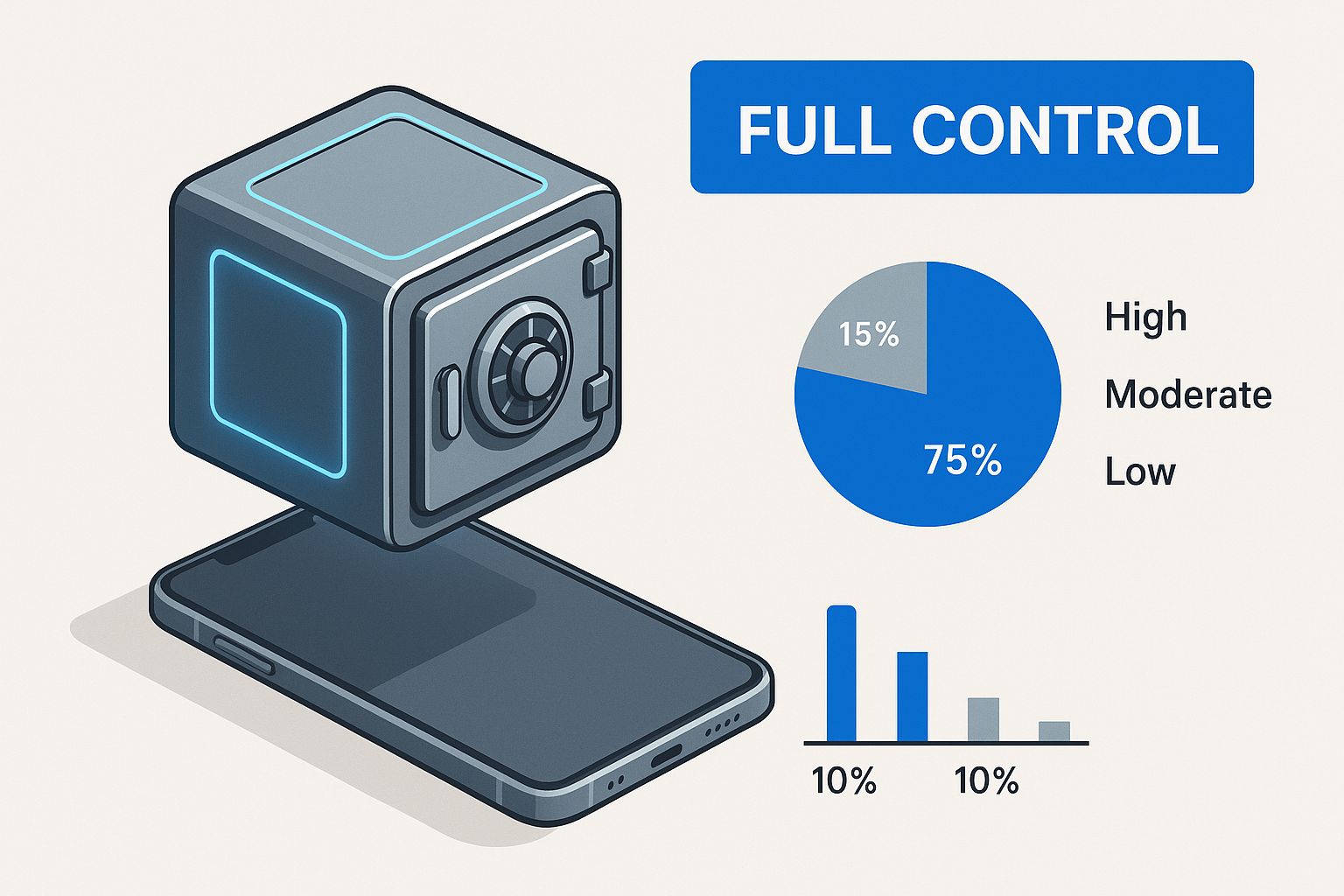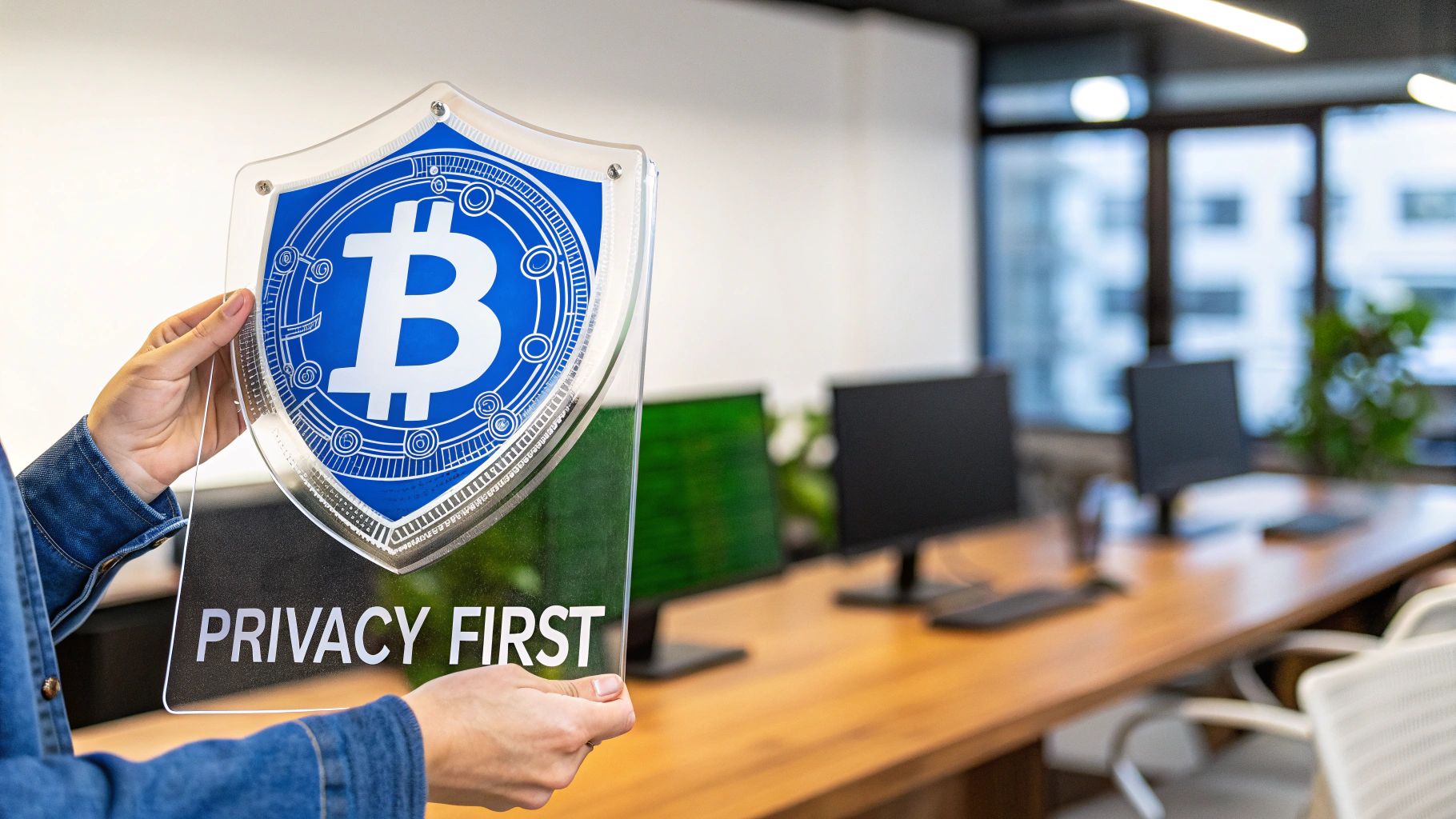Why Using Non-Custodial Crypto Payment Gateway Boosts Your Business

When it comes to your business's money, who's really in control? The whole point of using a non-custodial crypto payment gateway is to make sure the answer is always "you." It completely removes the middleman who holds your funds, putting you firmly in the driver's seat.
This means you get direct, undeniable ownership of your revenue the second a customer pays. No waiting, no third-party approvals.
Why Smart Businesses are Moving to Self-Custody
Choosing a non-custodial gateway isn't just a tech upgrade; it's a strategic decision to truly own your revenue, not just process it. This shift gives you complete autonomy over your company's finances, and frankly, it's changing the game for online commerce. When you hold your own private keys, you're building a more resilient and independent business.
This approach also shields your operations from the headaches and risks that come with traditional and custodial payment systems. Think about it:
- No More Frozen Accounts: If no one else is holding your money, no one can freeze it. Your funds are yours, period.
- Freedom to Transact: This creates a payment channel that can't be shut down or censored, which is a massive advantage for businesses in any industry.
- Lower Operating Costs: Cutting out the intermediaries means you also cut out their fees, which directly boosts your profit margins.
This move toward self-custody is part of a much bigger trend. Businesses everywhere are looking for more control and better security. The proof is in the numbers: the non-custodial crypto wallet market is expected to hit around $25 billion by 2033. That’s a clear signal of just how much demand there is for financial independence.
For more details on this incredible market growth, you can check out the analysis on datainsightsmarket.com. Now, let's dig into how this all works and what it means for your bottom line.
Custodial vs. Non-Custodial: What’s the Difference?
To really get why a non-custodial crypto payment gateway is such a big deal, let's start with a simple analogy. Think of a custodial gateway like a bank's safe deposit box. Sure, your stuff is in there, but the bank holds the master key. You have to trust them to let you in and to keep your assets safe.
A non-custodial gateway, on the other hand, is like having your own personal vault at home. You—and only you—have the key and the combination. This all boils down to one critical thing: who controls the private keys. In the world of crypto, whoever holds the keys holds the funds. It's that simple.
The Pitfalls of Custodial Models
When you use a custodial solution, you’re trusting a third party with your money. While it might feel simpler at first, you're also handing over control and introducing some serious risks that can hit your business where it hurts. Merchants often get blindsided by frustrating limitations that are completely out of their hands.
These aren't just hypotheticals; they're real problems businesses run into all the time:
- Sudden Account Freezes: The third party can lock you out of your account without notice, instantly halting your revenue stream.
- Unexpected Withdrawal Limits: Imagine needing to move funds for payroll or inventory, only to find the gateway has slapped a limit on how much of your own money you can access.
- Third-Party Data Breaches: Platforms that hold funds for thousands of users are a massive, glowing target for hackers. If they get breached, your funds are at risk.
The bottom line is this: if you don’t hold the keys, you don’t truly own the crypto. A non-custodial approach puts you back in charge, cutting out the middleman and the risks that come with them.
Embracing True Ownership
This is exactly where the non-custodial model steps up. It removes the intermediary and gives you direct, unshakeable control over your assets. Payments flow straight from your customer's wallet to yours. Instantly. No one can freeze your funds, and no one can tell you what to do with them.

The image above gets to the heart of it—having full control over your digital assets. With a non-custodial solution, your funds are always in your possession, accessible only by you. This shift toward self-custody isn't just a technical detail; it's about reclaiming financial sovereignty for your business.
To make the differences even clearer, let's break them down side-by-side.
Custodial vs. Non-Custodial Gateways: A Head-to-Head Comparison
This table breaks down the fundamental differences between custodial and non-custodial payment solutions, helping businesses understand which model best fits their needs for security, control, and flexibility.
| Feature | Custodial Gateway | Non-Custodial Gateway |
|---|---|---|
| Asset Control | The gateway holds your private keys and funds. | You hold your own private keys and funds. |
| Security | You rely on the gateway's security measures. | You control your security. Funds are not pooled. |
| Fund Access | Can be frozen or limited by the third party. | Unrestricted. Your funds are always accessible. |
| Transaction Speed | Can be slower due to internal processing. | Instant, peer-to-peer settlement. |
| Counterparty Risk | High. You trust the gateway won't fail or be hacked. | Eliminated. No intermediary holds your money. |
Ultimately, the choice comes down to a simple question: Do you want to rent access to your funds, or do you want to truly own them? For any business serious about security and control, the answer is pretty clear.
When it comes to crypto, you’ve probably heard the saying, "not your keys, not your coins." It's more than just a catchy phrase; it's a fundamental truth that gets to the heart of what makes non-custodial crypto payment gateways so much more secure for businesses.
This whole approach was born out of the inherent risks that come with centralized systems.
Think about it: custodial platforms, where someone else holds your crypto for you, are basically giant magnets for hackers. By pooling everyone's assets together, they create a massive "honeypot" that's just too tempting for cybercriminals to ignore. The crypto world is littered with horror stories of centralized exchanges going under, taking user funds with them forever.
A non-custodial gateway elegantly sidesteps this entire mess. Since no third party ever touches your money, there's simply no counterparty risk. Payments flow directly from your customer's wallet to yours. It's that simple.
Taking Control of Your Financial Security
This direct ownership model is a game-changer, and it's backed by some serious security features that are standard in the self-custody world. Instead of just hoping a third party keeps its promises, you get to decide exactly how your funds are protected.

For example, many businesses operating this way use multi-signature (multi-sig) wallets. You can picture a multi-sig wallet like a high-tech bank vault that needs more than one key to open. A transaction might require a signature from, say, two out of three authorized people in your company. This creates an incredibly strong barrier against both outside attackers and potential internal threats. For an even bigger security boost, you can layer in advanced tools like machine learning fraud detection.
The main security advantage is crystal clear: when you have exclusive control over your private keys, you and your customers are protected from the classic pitfalls of third-party platforms, like sudden withdrawal freezes, locked accounts, and intrusive KYC checks.
This model hands complete financial autonomy back to merchants and their customers, something custodial services just can't match by design. For businesses in high-risk sectors that are often unfairly targeted by traditional banks, this level of control isn't just a benefit—it's essential.
Unlocking Major Operational and Financial Wins
Beyond the ironclad security, the reasons to go non-custodial are all about your bottom line. It's a strategic move that directly boosts your revenue and makes your operations run smoother, starting with some serious cost savings.
Think about it: traditional credit card processors routinely skim 2-3% off the top of every transaction, and that’s before you uncover all the hidden fees. Non-custodial crypto payments, on the other hand, usually come with a low, flat fee—often under 1%. That difference goes straight into your pocket as pure profit on every sale.

This isn't just a niche idea; it's a model that’s catching on fast. Non-custodial solutions already make up about 25% of the global crypto payment gateway market, a figure pushed by businesses that value true decentralization and security. North America is at the forefront of this shift, commanding a 40% market share as tech-savvy companies jump on these benefits. You can dig deeper into these trends with the latest crypto gateway statistics on coinlaw.io.
Get Your Money Faster
Another game-changer is how quickly you get paid. With traditional banks, you’re often stuck waiting days for funds to clear and actually hit your account. Non-custodial crypto transactions? They settle almost instantly. The money goes from your customer’s wallet to yours in minutes, not business days.
This near-instant settlement is a massive upgrade for your cash flow. You can access and reinvest your revenue right away, skipping the frustrating delays that are standard in the old financial world.
That kind of speed gives your business a real competitive advantage, letting you be far more nimble with your financial planning and day-to-day operations.
Uncensorable Payments and True Global Reach
Non-custodial gateways give you a kind of financial resilience that traditional systems simply can't offer. Since you're the only one in control of your funds, no bank or third-party processor can freeze your account or block a legitimate payment. This censorship resistance is a lifeline for businesses in innovative or so-called "high-risk" industries that often get the cold shoulder from banks.
On top of that, this technology completely dissolves international borders. You can accept payments from anyone, anywhere on the planet, without battling outrageous cross-border fees, currency conversion nightmares, or the red tape of international banking. It genuinely opens your business up to a global customer base.
How to Choose the Right Non-Custodial Gateway
Picking the right gateway is a huge decision when you're moving to self-custody payments. This choice will shape everything from your day-to-day operations to your customer's checkout experience, so it’s worth taking the time to get it right. The best partner won’t just give you a piece of software; they’ll make the entire switch feel effortless.
Your first question should always be about integration. How easily can this thing plug into what you're already using? Look for pre-built plugins for platforms like Shopify or WooCommerce. This is where a provider like ATLOS really shines, giving merchants simple tools to get up and running without needing a developer on speed dial.
Key Evaluation Criteria
Next up, check out the coin support. Obviously, you need the big ones like Bitcoin and Ethereum, but what about other options? Supporting a good mix of altcoins and stablecoins can open your doors to a much broader audience. You also have to obsess over the user experience. A clunky, confusing payment process is a guaranteed way to lose sales. The whole flow needs to feel simple and natural for everyone involved.
When you're comparing options, zero in on these factors:
- Transparent Fee Structure: Don't get bogged down by hidden fees. You want a provider with a simple, upfront pricing model so there are no surprises on your transaction statements.
- Proven Track Record: Look for a gateway with a solid history and real, positive reviews from other businesses. This isn't the place to take a gamble; your payment processor is a critical piece of your infrastructure.
- Direct P2P Transactions: This is the whole point. A true non-custodial solution like ATLOS guarantees that customer funds go straight to your wallet. It's the only way to live by the "your keys, your crypto" rule.
A great non-custodial gateway does more than just move money around. It hands you the keys to real financial control. Things like clean API integrations and direct command over your funds aren't just nice-to-haves—they're essential for any business serious about self-custody.
By keeping these practical points in mind, you can find a gateway that actually fits how you work and helps you grow.
It's Time to Take Back Control of Your Company's Finances
Switching to a non-custodial crypto payment gateway isn't just a tech update—it's a fundamental business decision that puts you back in control of your own money. The reasons for making this move are straightforward and powerful. When you have direct control over your funds, you create a stronger, more efficient business that’s ready for whatever comes next.
Think of it this way: you’re in the driver's seat. You completely remove the risk of a third party mismanaging or losing your funds, because they never touch your money in the first place. At the same time, you slash transaction fees compared to old-school payment systems, which means more profit from every single sale.
Building a Business That Can Weather Any Storm
Taking control of your own crypto also means your business can't be easily shut down. Your income is protected from out-of-the-blue account freezes or random holds that can derail your operations. This is a massive advantage no matter what industry you're in.
It also opens up the entire world as your marketplace. You can accept payments from anyone, anywhere on the globe, without getting bogged down by the usual headaches of international transactions.
When it comes down to it, a non-custodial gateway lets you truly own your revenue, not just rent a system to process it. It's about building a more independent, secure, and ultimately, more profitable company.
Now is the perfect time to take a hard look at how you get paid. Ask yourself how a solution that gives you full control could set your business up for real, long-term success.
Got Questions? We’ve Got Answers.
We get it. Stepping into the world of non-custodial crypto payments can bring up a few questions. Here are some of the most common ones we hear from businesses just like yours.
Is This Going to Be a Headache to Set Up?
Honestly, no. Modern non-custodial gateways are built for real-world business owners, not just developers. You’ll find ready-to-go plugins for popular platforms like WooCommerce and Shopify, and for custom sites, the APIs are clear and well-documented. You can usually get everything up and running without needing a deep technical background.
What Happens If I Lose My Private Keys?
This is the most important part of self-custody, so let's be direct. If you lose your keys, your funds are gone. The gateway provider, by design, has zero access to your wallet and can't help you recover them.
This isn't a flaw; it's the feature that gives you absolute control. That's why backing up your seed phrase (think of it as the master key to your entire wallet) in several secure, offline places is non-negotiable.
What Will My Customers Actually See and Do?
For your customers, the experience is incredibly smooth. When they’re ready to check out, they just choose the crypto option. A unique QR code and wallet address will pop up.
From there, they simply scan the code with their crypto wallet app or copy the address, send the payment, and that's it. The transaction gets confirmed on the blockchain in minutes, the funds land directly in your wallet, and the order is complete.
Ready to take full control of your revenue with a secure, non-custodial crypto payment gateway? Get started with ATLOS today and experience what true financial sovereignty feels like.
Find out more at the official ATLOS website.